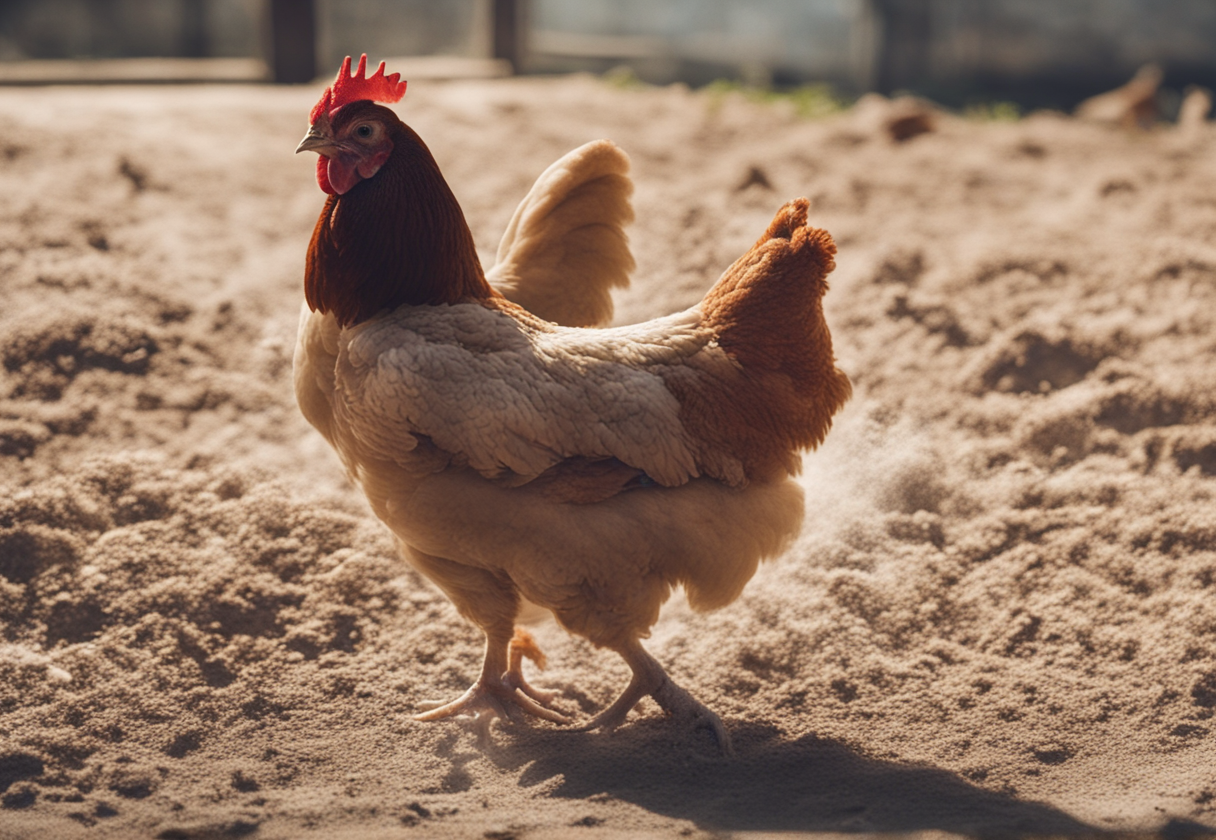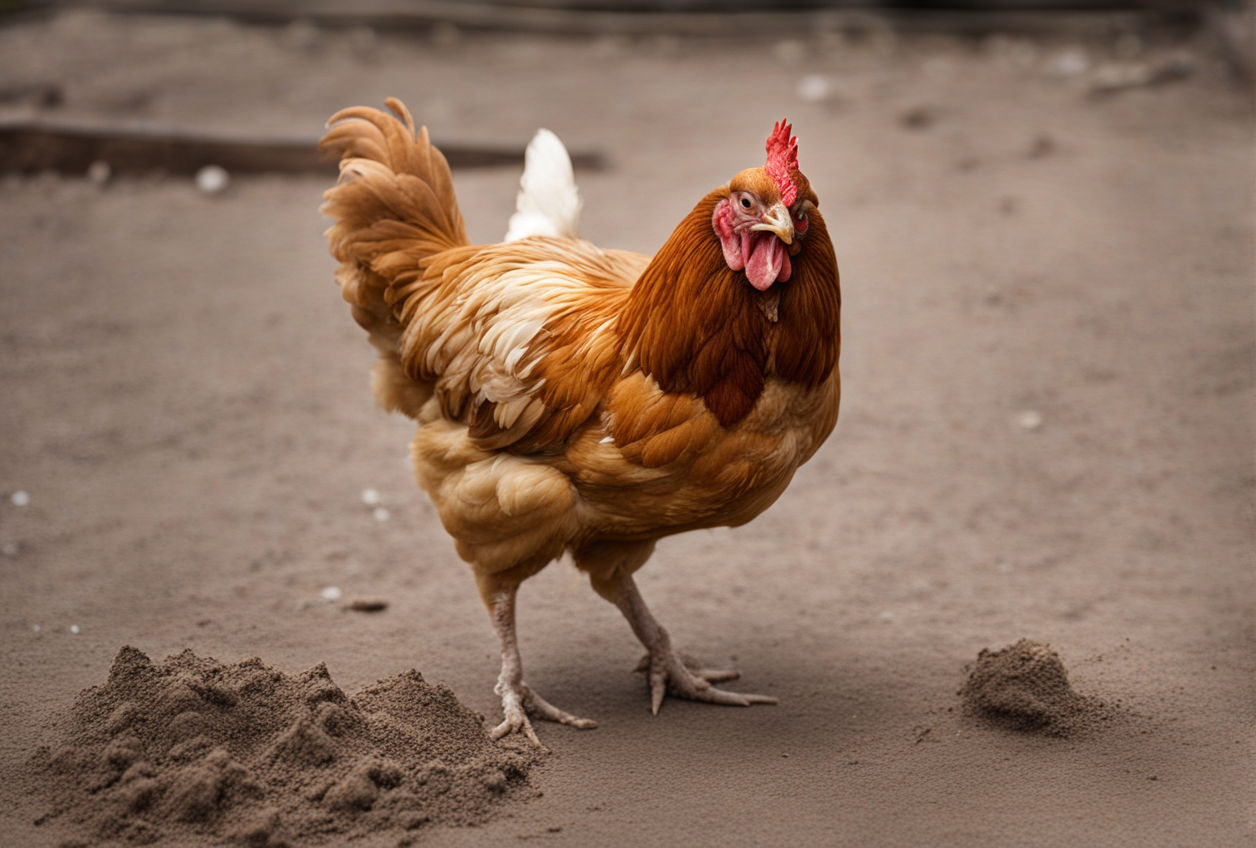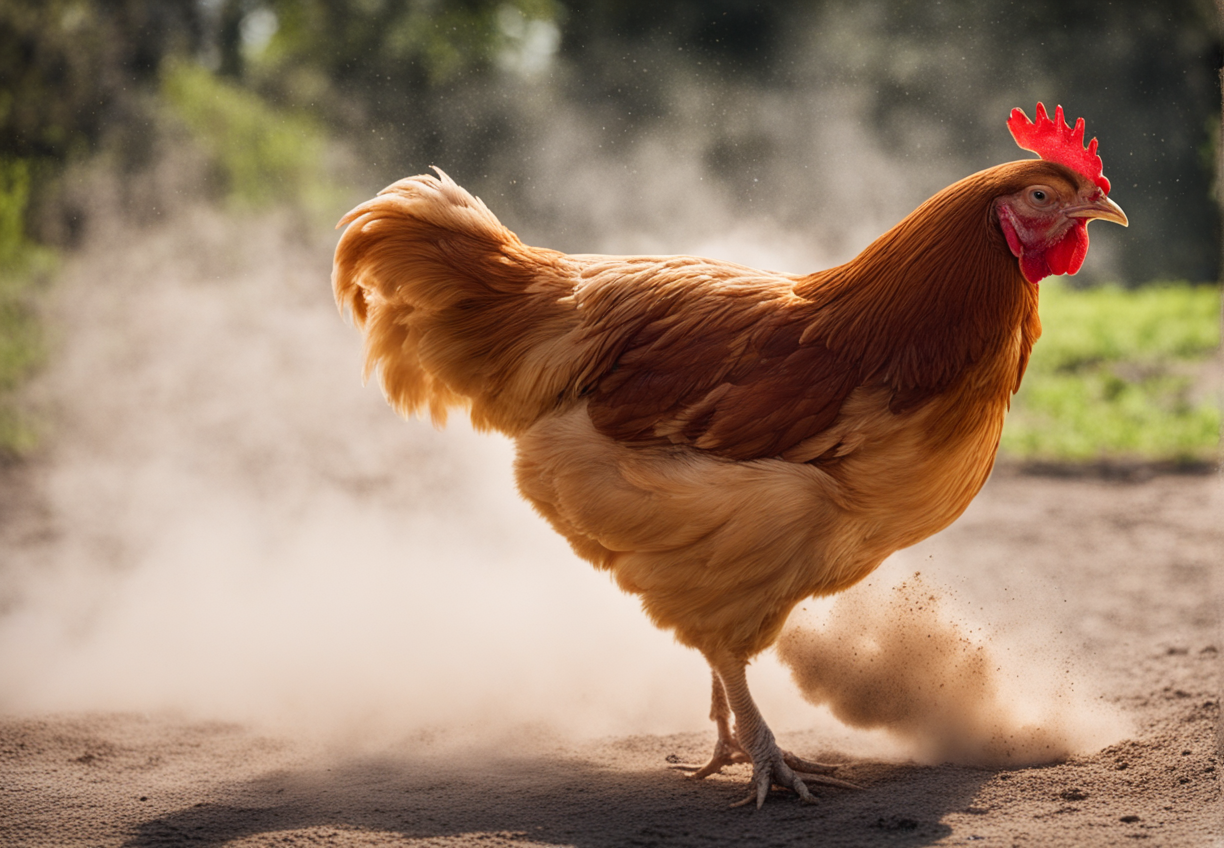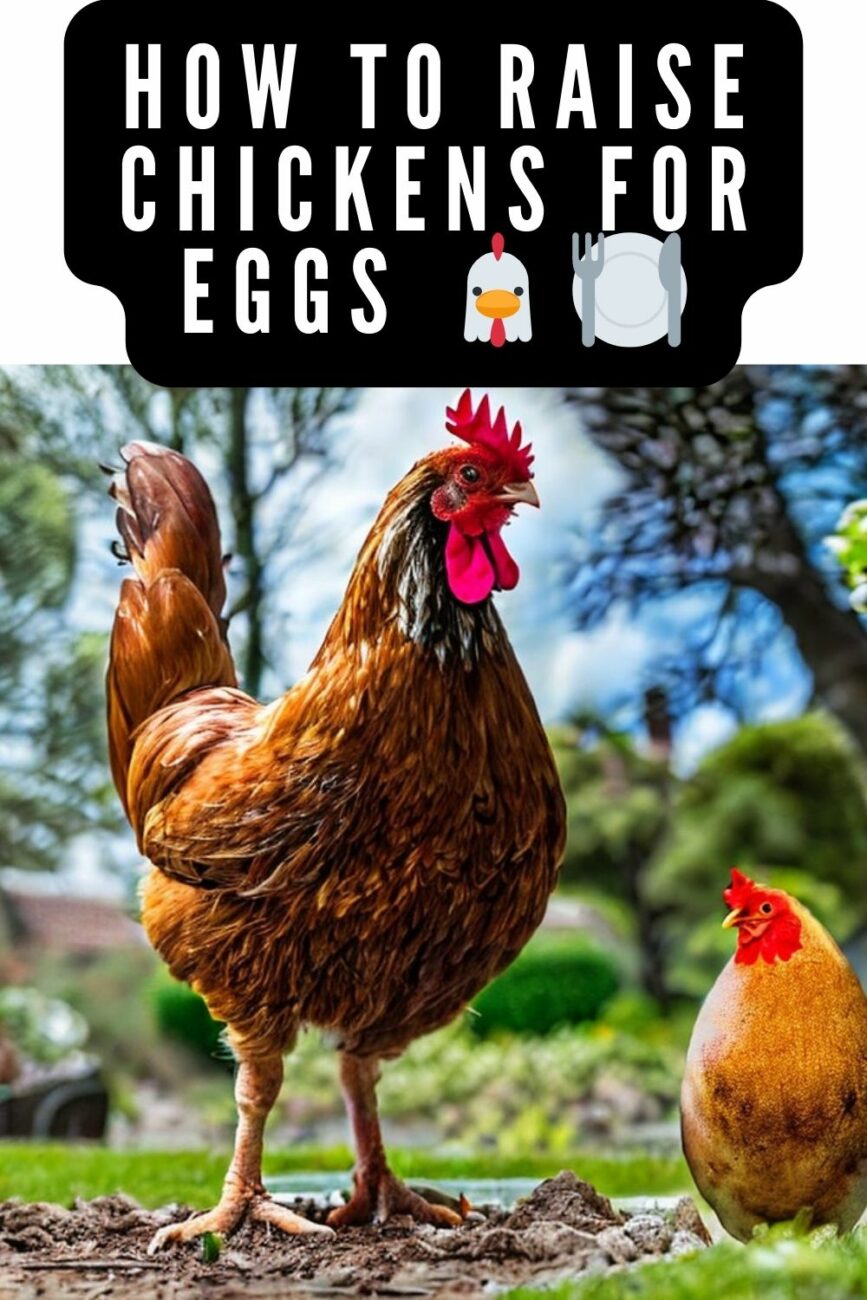Alright buddy, I gotta tell ya about the time I thought my chickens were throwing the wildest rager inside their coop.
I went out back to grab some eggs for breakfast and saw what looked like a thin layer of snow had fallen inside the coop. But it was like 90 degrees out so I knew that couldn’t be right.
I pushed open the door and almost gagged from the cloud of dust that blew in my face. It was like opening the towel drawer at a tanning salon, just dust everywhere.
When the dust settled I saw my chickens hopping around looking like prizefighters after a KO. Their feathers were caked in the stuff and I started panicking that something was seriously wrong.
That’s when the biggest dingus of them all, Henrietta, starts scarfing down a mouthful of the dust. The light bulb finally clicked—my chickens were the ones making the mess!
Chickens actually do eat dust and it’s important for their health. Dust bathing helps chickens stay clean and get rid of external parasites.
Table of Contents
Why Dust Is Chicken Crack

These birds have a strange jones for getting their gob full of dirt. I was always wondering what was up with that since they free-range on grass and scratches for food half the day.
Turns out chickens don’t have any choppers to break down their meals, just a muscular stomach called a gizzard. The grit and dust they eat gets tossed in there and grinds up their food like a food processor.
Even chickens that free-range still eat dirt because their diet of mostly plants and grains is tough to digest without some extra grit. Think of it like adding sand to a blender when making a smoothie-just helps it all blend together better.
The dirt and dust provides a similar function for their insides. It grinds and grinds against the tough plant matter until it’s small enough to be absorbed by their bodies. Pretty wild how nature designed that, huh?
It Ain’t Just About Eatin’

As if eating dirt wasn’t strange enough, chickens also love rolling around in it for other reasons too. These feathered friends don’t have sweat glands like us so they gotta stay cool somehow.
On a hot summer day you’ll usually find them taking dust baths. The fine powder of dirt, sand or ash coats their feathers and suffocates external parasites like mites, lice and ticks that like to call those feathers home.
Think about it- would you want to be a bug trying to hang on tight while your host is rolling around in basically baby powder for chickens? Nope, it knocks those creepy crawlies right off.
Dust bathing is also how they clean and waterproof their feathers. The dust absorbs oils on their skin and in their feathers so they stay dry and prevent bacterial growth underneath.
It’s like getting a spa treatment and delousing all in one. No wonder chickens can’t get enough of the dirty stuff!
How to Keep Your Chickens from Trashing Your Pad

As much as those birds love their dust time, it’s no fun trying to sit on the porch when their coop looks like a mining site. After seeing my mess I knew I had to make some changes.
Now I have a big Rubbermaid tub filled with play sand, crushed oyster shells, and some wood ash in the yard. Each morning when I let the girls out they make a beeline straight for their dust station.
Having a designated dusting area keeps them from using their whole enclosure like a giant litter box. I refresh it every other day which seems to keep them very happy.
Another perk is now I can hose out their coop without a masking worrying about a lung full of dust. Way easier to clean up when it’s just feathers and not a particle board factory in there.
Giving your own chickens their own dusting den will save your lungs, coop and sanity too when it’s cleaning time.
The Dirt on Dust: Some Fun Facts
Here’s a few more interesting nuggets I learned about why chickens chomp on dirt:
- – On average, chickens will eat around 1/5 of their daily diet as grit and dust to aid digestion. For a full-grown chicken that could mean almost 1/2 cup of dirt a day!
- – Certain types of dirt are better than others for chickens. Soft, dry, crumbly soils like playsand are best. Avoid muddy or dusty areas that could cause respiratory issues.
- – On really hot days, chickens may dust bathe several times to stay comfortable. The dirt helps wick away body heat since they can’t sweat like us.
- – You’ll sometimes see chickens picking through dirt with their beaks, eating peckfuls. They can sense the mineral makeup and selectively eat what’s best for their individual needs.
- – Hens need extra calcium when laying eggs and will often seek out crushed oyster shells in their dirt to meet those needs. It’s like fast food for chickens!
What Types of Dust Are Best?
Not all dust is created equal when it comes to chicken enjoyment.
Soft, crumbly soils like play sand, wood ashes, or dried potting soil work best since they won’t compact down in rain or packing.
Avoid anything muddy or dusty which could cause respiratory issues if inhaled.
Crushed oyster shells are a favorite since they supply extra calcium hens need for egg laying.
Granite dust left over from stonecutting can also be used if from a natural source with no additives.
Some farmers even mix in diatomaceous earth which has silica to aid digestion and parasite removal through its abrasive quality.
Stay away from things like kitty litter or clay-based soils that could stick to feathers if overused.
How Often Should You Refresh the Dusting Area?
Most folks refresh their chicken dust bath every 3-4 days during active seasons.
Hot summer months and when hens are in full lay see the most use as they self-regulate based on needs.
Add new material if it becomes too packed down from dusting to allow proper coating of feathers.
Some signs it needs changing are lots of fluffed up chicken dust floating around or you see overall decreased usage.
In colder months when dirt bathing decreases, refreshing weekly to bi-weekly still keeps it appealing.
A quick stir with a rake or hoe also helps fluff it back up between full changes.
Having consistent, sanitary dust sites helps prevent external parasites and skin issues long-term.
Can Chickens Get Too Much Dust?
It is possible for chickens to overdo it on dust intake.
Excessive amounts have been linked to impaction or lack of appetite if consumed at unusually high levels.
Dust bathing too long or vigorously on very hot days could also potentially cause respiratory distress.
Signs of an issue may include labored breathing, coughing, or lack of energy after bathing.
Offering extra water during summer months mitigates risks as dehydration enhances any potential impacts.
Avoid letting birds bathe in extremely dusty areas like freshly tilled soil that puts up clouds of particulate matter.
Moderation and monitoring your flock is key to ensure dust stays an enjoyable, healthy part of their routine.
Can Human and Chickens Share the Same Dust?
While chickens enjoy a variety of dusting materials, some are not suited for human use as well.
Kitty litters, clay soils, and calcined clays can contain silica dust or other contaminants not meant for inhaling.
Diatomaceous earth is another one best left to chicken consumption due to silica content.
Natural sands, crushed shells, wood ashes or potting soils in moderation pose little risk however.
Always be sure the source you source materials from is clean with no added chemicals, scents or dyes.
Never allow children to play in active chicken dusting areas either due to risk of parasites or contaminants.
Common sense precautions like that mean both humans and chickens can safely enjoy dusting in their own way.
Does Dust Bath Temperature Matter?
Chickens tend to dust bathe more frequently on hot sunny days to help stay cool.
Warmer material will allow optimal coating of feathers to wick heat compared to clumpy cold dirt.
On very hot days, offer dust baths in partial shade or consider a mister to avoid heat stress.
Cold rain or snow will clump feathers together and make dusting less effective for insulation.
Most flocks still bathe some in all but sub-zero conditions as part of their natural routine.
Adjust depth, location and refreshment frequency based on seasonal temperature swings.
Happy chickens are healthy chickens – keep their dusting desires in mind year-round.
Can Dust Baths be Too Wet?
While chickens don’t mind a little moisture, dust areas shouldn’t be muddy quagmires either.
Excess water prevents proper dust coverage and clumps feathers together defeating the purpose.
Heavy rain or irrigation runoff that soaks the dust warrants refreshing material more frequently.
Adding crushed egg shells, wood ash or other absorbents can help keep material loose on wetter soils.
A tarp, roof or wind break nearby provides chickens option to fully dry off after wet bathing as needed.
Mud wallows serve a different hygienic purpose than dusting so keep the two areas separated.
Dry, crumbly material is always best for maximum dusting enjoyment and results.
